






- about an age and a country away, but I did say I would write more. Well, as we have no space in the car for all the birthday presents I might have got, this year my treat was going to be of the non-physical variety. For weeks I had noticed Stuart and Merryl whispering and suddenly shutting up, and whenever we did any trip planning there was a gap around my birthday where they couldn’t tell me where we were going to go. Then Merryl mentioned that she would be going rafting on my birthday weekend and a little later we were heading for Kampala, but I still had no idea of the size of the surprise until we drove around Kampala on the day before my birthday after Merryl had left, trying to follow the GPS without giving away the destination. We were going somewhere in town, but the GPS kept sending us down closed-off roads. Eventually we did end up where we were going, the Kampala Serena Hotel, poshest of the posh in that part of the World. A whole weekend in a real house with real rooms and real windows! Not only that, but there would be running water, straight into a nice bath tub, with white towels, and a toilet that flushed, and a shower with water pressure (my big obsession), and a sink with a mirror and everything! The water might even be hot, if I wanted it...
And that was just the beginning. There was a huge bed with white sheets and the mattress was most un-lumpy, and there were lots of plump pillows, and little bed side tables, and lamps I could switch off from the bed without getting up, and in the evening someone came to turn the bed down.The room had air con and a mini bar and a balcony and a soft chair, and a TV with lots of channels, none of which were silent or fuzzy. To crown the luxury there was wifi with a decent speed and no cut-outs (which is more than can be said for the other 5 star hotel we tried recently, where high-speed internet translated to 192kbps). Too much!!!
A whole weekend with this luxe lifestyle made me quite crazy, I didn’t know how to spoil myself first. Should I have a bath (of course) or a snooze on the bed? What could I download while I was here? Should I watch some TV? Or order room service. It was quite stressful, I tell you, and on top of all that Stuart and Merryl had arranged for me to have a massage and a manicure in the spa. As it turned out that was the best thing that could have happened, as I was totally relaxed after that.
So I promised that I would write about the people we meet on our travels, and now that we have been on the road for slightly over 100 days (yay!) I feel that we have met a good collection of different types of people, so I am going to write a little mini-series.

Let's start with the non-locals. There are a few varieties of those, one of which is the independent traveller (as opposed to the overland tourists, who require a separate post with their big trucks). We meet them at designated traveller hangouts like Fat Monkeys at Lake Malawi, Jungle Junction in Kenya and Eureka Camp near Lusaka. It’s usually a couple between 30ish and 50ish, who have put their jobs on hold to spend a year or more travelling. They drive a robust 4 wheel drive, or a huge MAN truck, or a bashed up old Defender, and they can spend hours discussing car fitouts, routes and favourite camp sites in a range of countries and continents. Some are driving the classic Cape to Cairo (or Cairo to Cape) route, while others loop down through West Africa and up the other side, while we have also met a few open-ended trips, where the plan really just consists of “a year in Africa, a year in Asia and then who knows.” Example:
Jan and Trevor - they left London in their kitted out Landrover for a gap year, driving through Europe, to Turkey and round the Med into the Middle East. We met them in Uganda where they were heading to Rwanda to finally arrive in South Africa at the end of the year. Trevor is a twitcher, so Stuart got on famously with him, as Jan and I were busy sharing movies and audiobooks from their terabyte drives. Entertainment is important on a long journey like this.

Poomba, aka Mandy and Jacques, had been on the road for 14 months when we met them at Fat Monkeys on Lake Malawi. They were heading back home to South Africa from Australia, having shipped the car to Novosibirsk to cross Asia and Europe. Their Land Cruiser was home made, and after such a long trip everything most definitely had its place.
The first big truck we encountered made quite an impression on us. Two German guys had dissolved their company to pay for a brand new truck to be fitted out so that they could go on a World tour. When we met them in Lusaka they had already spent a year dawdling their way down from Europe, planned to spend another year in Southern Africa before shipping the monster truck to South America and carrying on. They were so self sufficient, they looked like they may never return to stationery life.
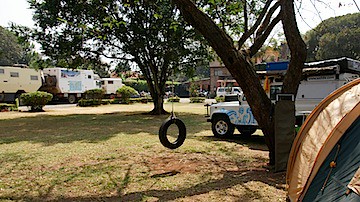
It all started in Uganda. We had planned on going from Tanzania through the Serengeti to Rwanda and round Lake Victoria to Uganda. Instead, because our suspension broke, we had to go to Nairobi to get it fixed. This meant that our visit to Uganda (we scrapped Rwanda in the end) was a detour rather than another place on the route. Returning to Nairobi to meet up with Mark and Martina for their two week holiday we had another detour, going to the beach. Added to this the fact that we are half-way through the journey, and somehow I lost track of the spirit of travelling to a destination.

The messy route (see the blue line for the planned route)
Yes, we were moving from place to place; yes,we were seeing new things, but we kept looping round as if we had lost our way. A week of totally flopping out on the beach was just the last straw. With the ocean in front of us and a country we had spent the best part of 5 weeks in behind us it felt like we had become mired. From the start we had been all about the forward movement, the going North, the putting miles under our belt, the getting there. Now we were meandering around the fixed centre of Jungle Junction and we seemed to be unable to extract ourselves from its pull.
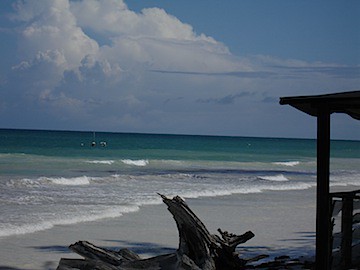
Long story short, we are off to Ethiopia via Lake Turkana tomorrow, a great big new adventure as we leave behind the relative civilisation of Kenya for the unknown North.

When we worked out our route we had planned to travel from Tanzania North to Rwanda and Uganda, looping round Lake Victoria to enter Kenya from the west, but problems with the suspension prevented us from doing this. Instead we spent a few days in Kenya, heading up to the Lake and Uganda for a slow meandering arc returning us back to Nairobi after a couple of weeks. The result was that travelling in Uganda felt a bit aimless, being without a northward goal. The place still managed to get into my new top 3 country list (with Malawi and Namibia), for the amazing rain forest, the chilled people and the very funky monkeys (red-tailed, blue-tailed and black and white Colobus). We had no trouble to speak of, despite ongoing problems in the DRC next door and recent riots in Kampala related to changes in government.

Uganda also provided us with two new top ten campsites, a fab birthday treat for me and the fulfillment of one of Stuart's life ambitions, to see the mountain gorillas. We started to call Uganda the land of surprises, as it was so different from our expectations, and just when we thought we had worked out what kind of place it was, a new and unexpected vista opened in front of us.

Uganda was hills after hills after hills of green fertile farms, growing bananas, coffee, plantain and potatoes all mixed up together; it was riding our horses through the sugar cane fields and saying Jambo to every single child along the way, including stopping business at the local primary school; it was the perfect camp site and the wettest, a fabulous lake location where we got stuck due to the beauty and great company for far too long; it was also the frustration with badly-maintained sites that had so much going for them if someone just bloody well fixed the plumbing!; it was our first encounter with real rain forest, a green and dense mass of leaves, mushrooms and monkeys, being chased by the most evil mosquitos, struggling for air in the damp, cloying, hot, wet air; it was intense downpours which broke our awning and my patience, giving us clammy clothes and shoes for days and a great excuse for watching movies for a few days.

And then, after we decided that Uganda was pretty much a big lake and a lot of forest, we arrived at Queen Elizabeth National Park and discovered the Western Rift Valley, with its volcanos and crater lakes, great big hollows where we could watch elephants crossing the high grass way below us, where herds of Topi grazed among Uganda Kob, where water buffalo wallowed in grey damp patches until the layer of mud cracked off their hide, where pools of blue water shimmered against the salty edge separating wet from green, where we could see the next rain storm coming from an hour away across the acacia plains, a grey mass swallowing up the ground and the horizon.

Either we are getting more sociable or Uganda just has more interesting people, but we made some real cool new friends: a particularly good source was the Rwenzori guesthouse in Fort Portal, where we chatted with Donna the gorilla marketing lady from VSO, an auditor working on anti-corruption campaigns for USAid, some chimp researchers, an Israeli couple on holiday who entertained us with their horror story of getting Malaria on the second day of their trip, and the host himself, an opinionated Brit with fourteen years in Uganda and he was not holding back. We learnt a lot. Mustn't forget to mention the other overlanders, Trev and Jan, Anja and Jörg and Ben and Kate, fantastic company and deep wells of information, GPS tracks and ripped DVDs.
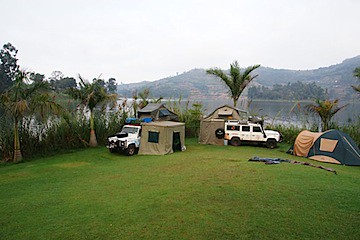

Road works. Spreading large rocks across the road is one way to ensure no-one drives on this new stretch. Another popular potion is the paying of green branches instead of using road cones or warning signs. At first we thought that a careless truck had damaged the roadside bushes, until we came around a corner and almost drove into the back of a steam roller.
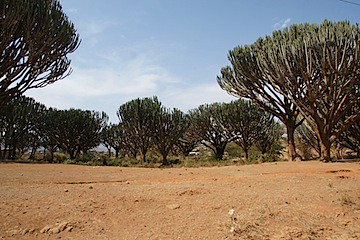
Candelabra Euphorbia, a completely useless tree as far as I can make out, consisting of a normal tree trunk with a bunch of cacti attached instead of branches. Honey made by bees collecting from these euphorbias is inedible as it burns the mouth and the fruit is poisonous.
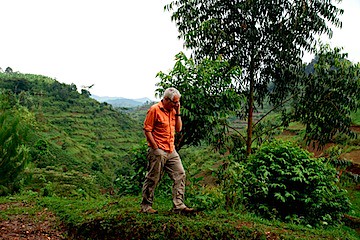
Stuart's last conference call with London took place on the side of the road at Bwindi Impenetrable Forest Reserve, amidst banana plantations and small curious village children.
I haven't written much about the weather on this trip, mainly because we haven't had much of any note. It's sunny, warm, with blue skies. There were a few cold nights in the South, where it was winter when we left, and in Namibia we had night frost one time, but otherwise we have not noticed the weather.
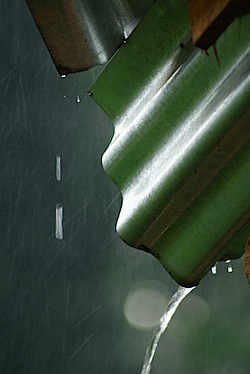
This changed when we reached Uganda. The region is in the small rainy season right now, and while Kenya is suffering from a horrible drought, Uganda has rain almost every day. This meant that for days, while we were camping out at Bwindi Impenetrable Forest, we had wet feet, wet socks, wet shoes. When it rained it was not a shower or a drizzle or even a proper cloudburst, but a torrential downpour lasting hours without letup, fat drops banging on the tent roof where we took refuge to watch a movie. The water washed down the paths and cascaded over steps, collected in small lakes on every level surface and dripped from reed roofs and leaking drainpipes.

It makes the rainforest the dense green mess that it is, of course, impenetrable indeed, but it made me miserable after a few days. Nothing was drying, and at one point we lost the awning (which we use as an ancillary tent in bad weather). The weight of the water that collected during one deluge was so heavy it bent the 1 cm square welded aluminium strut that holds the awning horizontal (it has since been fixed).

It is amazing to me that the subsistence farmers who live around Bwindi handle these torrents of water so well. They live in small huts with reed roofs, no windows or doors, walk along stony paths and have no real means of drying anything should it get wet. It's like permanent camping. This water is good for the forest, and the banana fields, but it can't be all that healthy for humans.
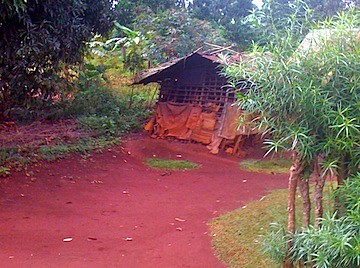
Before:
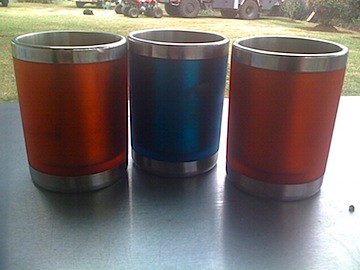
After:

Merryl has gone home and we miss her mucho. Come back soon, Merryl, your mug is waiting for you!
Crossing into Kenya from Uganda, at Busia, was the usual mayhem. Goods trucks were parked in long rows down the main street waiting for their paperwork to clear. Young guys run up to the car to offer their services as middle men to handle our customs and visas for a fee. We learnt very early on, at Kazangula in Zambia, where the signs at immigration insist that no brokers are allowed to deal with the officials, that we didn't need or want someone helping us. As it turns out, at every single border crossing there is a very simple process: get the visa, sort out the car through customs, pay any taxes or fees, done - move on to immigration on the other side and repeat with other taxes to pay and other forms to fill in. That sounds easy, but of course is attended by uncertainty and chaos. Still, we wouldn't trust someone with our passports, our dollars, our car papers. Instead we found a place to park in the midst of trucks, soldiers, vendors selling cold drinks and snacks and officious looking men, and wandered off to find immigration to get our exit papers.

One thing that has been singularly lacking at the borders has been decent signage. There are any number of huts and containers serving as offices, forex shacks and barracks, but nowhere a clear sign who does what and where to go next. The best option for us in the beginning was to follow the overlanders in front of us and hope they knew what they are doing. Eventually we worked out to look for the distribution point of immigration forms, although those are sometimes just photocopied sheets, so that is not so easy either.

Once we have located immigration, we fill in forms that are never looked at again by another human being - first name, last name, passport details (which I know by heart by now), length of stay, mode of transport, contact details. Then we get scrutinised to make sure we match our passport photo and sometimes have to fill in a big ledger, too, and that's usually it. We haven't overstayed our visa anywhere yet, so I don't know what would happen in that case. I suspect a small dollar amount would take care of it.
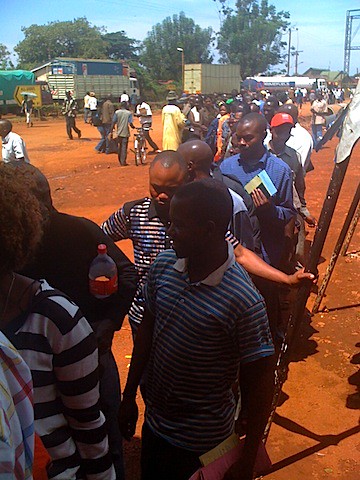
After immigration, customs. Stuart usually does that part. It means getting the carnet stamped to leave the country, and sometimes the payment of exit taxes. When we left Kenya, we had spent two days over our seven day transit limit and had to pay US$40 for road tax. No big deal as we hadn't spent anything coming into Kenya. Getting the car out of a country is usually also a pretty easy affair. No-one has so far even wanted to look at the car in case we were smuggling something, or even checked our insurance.
Before we started I thought that the border crossings would be day-long events, where our car gets taken apart Cold War style, our intentions are scrutinised and we might be sent back for lack of the right paperwork. As it turns out we are through much faster than the backpackers travelling by matatu or the overland trucks with their crowds of youths. May it stay like this for the rest of the journey.
Literary bend or political comment?
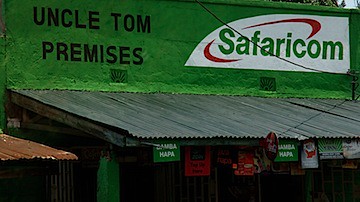
The Ankole of Uganda breed cows for the size of their horns and have 100 different names for the colour of their cows' skin. They don't raise cattle for dairy or meat, but for social status, and cattle are the currency attached to the bride price, a hot topic in Uganda today (there was a whole page article about the formalities of bride price in the paper last weekend). Unfortunately this little obsession results in overgrazing and soil erosion. Nowadays there are efforts to interbreed the Ankole cows to make them yield more milk so that they have some practical use.
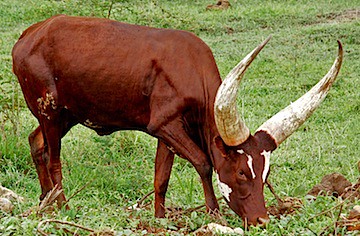
I wonder how often people who have checked in actually check out again. Very Hotel California.

The Ugandan border town of Busia is obsessed with uniforming the border staff. The colour scheme is cool. Money changers wear yellow jackets on the Ugandan and purple jackets on the Kenyan side, and the bicycle taxi drivers (?riders?) wear a fetching shade of pink. Fab.

...that we had an accident? Yup, our first day driving in Nairobi, and we run into another car on a roundabout. I have in the past experienced some crazy drivers, I spent 2.5 years in the maelstrom of Dubai's motorways, mixing it up with multiple different driving cultures, and even drove a minibus in India once, but never have I experienced drivers with such nerves of steel. Normally one look at our bull bars and people tend to back off, so slowly but surely elbowing your way across a junction tends to work (they even managed to intimidate Joburg minibus drivers, a notoriously rude lot), but here everyone plays chicken and we blinked too late. The result was a huge dent and scratch down the other car and a little bit of paint to be scraped off our bull bar. Shame (as they say with a smirk in South Africa)!

Since we are mzungu the traffic warden who didn't witness the accident took one look at us and decided it was our fault, not the guy who pushed his Nissan (not so) Hardbody into us in his desire to cut across in front of us. This meant sorting out a replacement for his damaged door. There followed 4 hours of tense negotiations (thanks, Fred!) in a backyard smelling of rotten fish (fertiliser factory) until we managed to negotiate the cost of a replacement door for an already dented, fertiliser-smelling wreck of a Nissan ute down from US$1000 to $70, which was a bit more realistic. We have been more respectful of African drivers since, mainly because we suspect that any damage will always be our fault, and as the t-shirt says: "This mzungu's ATM is out of order."

I have to write an extensive post on the fabulousness of the Kampala Serena Hotel, a weekend here being my birthday treat, but just to get you going, here is the cake the hotel came up with. I love this place! And the water pressure, well it's amazing...
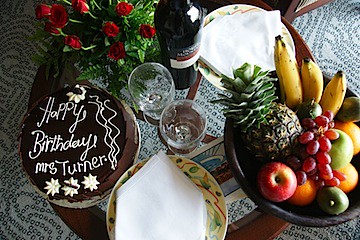
"Causes of high spread of HIV/AIDS on border points"
(from a leaflet on display at the Tanzanian border)
"Young officers at border points find it a matter of pride to have sexual contact with foreigners -- not knowing that they endanger their lives by contracting HIV/AIDS
Sex is used as one of the means of corruption from people who criss-cross the border on business missions. This causes the respective staff ti have an array of lovers and hence run the risk of contracting the killer virus. Wrong notions on the use of condoms to the effect that it renders men impotent also greatly contribute to the infection rate. There are also people who pour petrol on theis sexual organs immediately after having sexual sessions believing that the liquid could stiffle (sic) any infection. This (sic) people end up damaging their private parts.
Remember:
Avoid staying jobless. There are people who find themselves with nothing to do and hence go for drinking sprees which ultimately tempt them into having sex...."